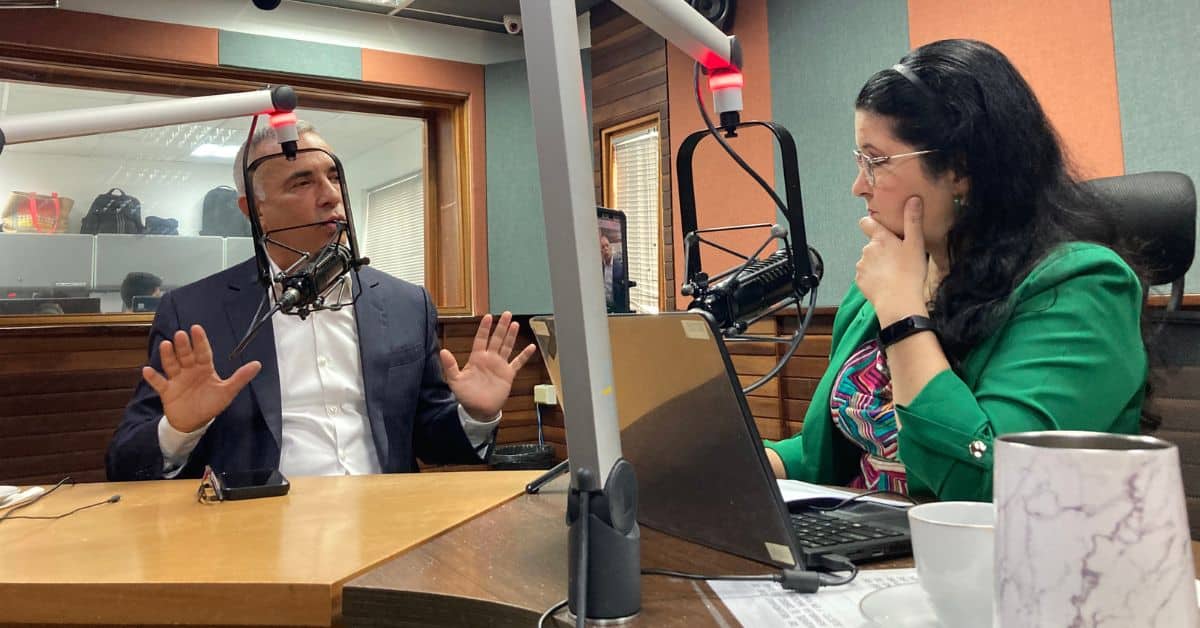
Táchira governor Freddy Bernal (left) being interviewed by journalist Mary Pili Hernández for Union Radio network. Photo: Union Radio.

Orinoco Tribune – News and opinion pieces about Venezuela and beyond
From Venezuela and made by Venezuelan Chavistas

Táchira governor Freddy Bernal (left) being interviewed by journalist Mary Pili Hernández for Union Radio network. Photo: Union Radio.
This Wednesday, January 11, the governor of the state of Táchira, Freddy Bernal, reported during a radio interview for Union Radio network that actions are currently being examined for the regularization of currency exchange houses in the municipalities of Pedro María Ureña (San Cristóbal) and García de Hevia (La Fría), with the purpose of offering citizens spaces supervised by the Venezuelan government.
Bernal noted that the structures managed in Colombia for the processing of different currencies are centralized in currency exchange houses, with almost 1200 operating legally in Cúcuta, while in Venezuela this type of transaction is carried out in “kiosks, warehouses, and private establishments.” He said that “we are going to regulate that,” and that “order must be set in this regard,” since commercial activities are carried out in Táchira in three currencies.
Colombia’s President Petro Meets President Maduro for 2nd Time in Miraflores (+ELN)
“The state of Táchira presents three particular economic realities that are different from other states of Venezuela in terms of the currencies found in the regional market,” he said. “Payment in US dollars represents 10% of all transactions, bolivars 20%, and the Colombian peso 70%.” The governor noted that the economic improvements in the state of Táchira are tangibly evidenced in the last quarter of 2022. “From October to December 2022,” he stated, “there was an economic peak at the border (with Colombia) of $700 million (in trade) and (trade) projections for 2023 are for $1.5 billion.”
Bernal’s comments came after a question by journalist Mari Pili Hernández for Union Radio, when she asked him about the distortions on the bolivar exchange rate due to the implementation of Resolution 8 by Colombian authorities a few years ago. This resolution allowed currency exchange houses in Cúcuta to define a different exchange rate to the bolivar—just valid for Cúcuta—thus distorting the value of the Venezuelan currency in the border and contributing to what Venezuelan authorities have called the “criminal dollar,” or the dramatic devaluation of the bolivar during those years.
The governor explained that because of the recent trend of using the Colombian peso in many transactions within Táchira, he had—in 2021—proposed and implemented the opening of bank accounts for Táchira residents in Colombian pesos. This was in an attempt to reduce the negative impact of border currency exchange operations in the overall value of the bolivar, something that had a decisive role in the devaluation of the bolivar between 2015 and 2019.
Border security
Táchira’s governor stated that the work carried out on the border axis, now with the full opening of the border, has generated a new reality, that differs from the one that the residents of the neighboring municipalities have suffered for years. “Three years ago we found a mad house,” he said, in reference to former governor from Democratic Action, Laidy Gómez, “and today we have managed to make the state a zone free of paramilitaries.”
He noted that 17 paramilitaries are still active in Colombian territory, a situation not present in Venezuela, which is why those who were affected in the past can be safe in Venezuela today. “Today, the rancher can go to his farm without fear of kidnapping, the businessman can open it without paying any bandit,” he said. “In Táchira, there is no kidnapping or extortion.”
Negotiations for binational passenger transport
Táchira state transport cabinet accompanied different drivers that make up the lines providing services from the Venezuelan border axis to the Cúcuta Public Transport Center in Colombia, with the purpose of regularizing procedures for the passage of public transport to Colombian territory. José Rosales Aleta, coordinator of the regional cabinet, said that “all the documentation required by Colombian legislation is being compiled” to transfer service of the lines that have historically been doing this work for over 70 years.
“Minister Velásquez Araguayán and governor Freddy Bernal keep the border issue at the forefront of their respective agendas,” he noted, “as well as that of land transportation, for this reason we are constantly receiving guidelines from said authorities to improve the mobility service.” Rosales Aleta reiterated that these first steps show the unity that the presidents of Colombia and Venezuela envision regarding the continuation of operations for the collective benefit of both countries on the border axis.
(Últimas Noticias) by Carlos Ramirez, with Orinoco Tribune content
Translation: Orinoco Tribune
OT/JRE/AU